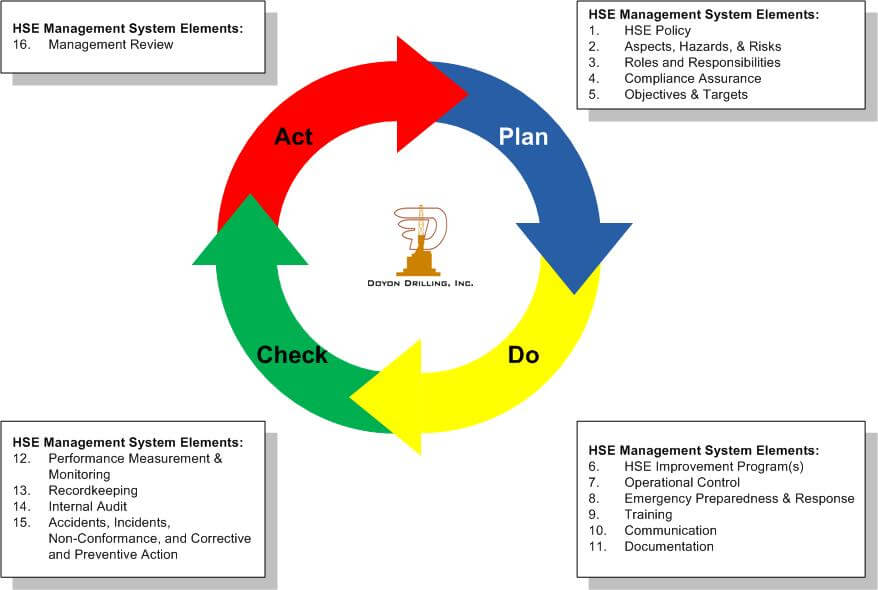Health, Safety, and Environmental

The health and safety of our fellow employees are at the top of our list at Doyon Drilling. As we strive to be the industry leader in Arctic Drilling, HSE is priority one, not because the law requires it, but because we believe it is of utmost value to our operations. Our employees are our most important assets – without their efforts we cannot succeed as a company. Everyone’s best interests are served when we stress health and safety in all of our operations.
In the same way, we care about the environment where we live and work. Protecting the natural beauty of Alaska and respecting our resources helps to improve the quality of our lives and the communities where we live.
HSE Management System
Doyon Drilling Inc. (DDI) has implemented a Health, Safety, and Environmental (HSE) Management System to demonstrate HSE leadership, commitment to continual improvement, and HSE responsibility to its stakeholders – namely clients, employees, suppliers, shareholders, local, State and Federal regulators, and the communities in which DDI operates. This HSE Management System describes how DDI will implement the commitment to meet the company’s HSE Vision, Goals and Expectations.
The purpose of the management system is to provide the overall structure to key management processes that drive workplace health, safety, and environmental performance at DDI. The scope of this HSE Management System is DDI’s facilities and operations.
The overall HSE Management System consists of the following sixteen key elements that form the basis of a systematic business process leading to continual performance improvement over time.
- HSE Policy
- Aspects, Hazards, & Risks
- Roles & Responsibilities
- Compliance Assurance
- Objectives & Targets
- HSE Improvement Program(s)
- Operational Control
- Emergency Preparedness & Response
- Training
- Communication
- Documentation
- Performance Measurement & Monitoring
- Record Keeping
- Internal Audit
- Accidents, Incidents, Non-Conformance, & Corrective & Preventive Action
- Management Review
An HSE Management System Manual provides an overall description of the system elements and provides direction to the specific implementing policies, programs, processes, and procedures that comprise the complete system.

HSE Department Organization
Doyon Drilling has a department dedicated entirely to Health, Safety, and Environmental compliance. We work closely with our personnel, our customers, and other contractors to provide a safe workplace for our employees, protect the environment, and maintain compliance with governmental and customer requirements.

Health, Safety & Environmental Policy
Doyon Drilling, Inc. (DDI) is committed to operating as a safe, environmentally sound and cost-efficient Oil Well Drilling/Workover Contractor. Our goal in all operations is to eliminate losses due to incidents, accidents, and spills that affect personnel, equipment, and the environment. To accomplish this goal, DDI shall maintain, promote and reinforce the following:
- Compliance with all applicable governmental agency regulations, industry standards, and our customer’s contractual requirements.
- Establish and maintain programs which provide for accident prevention, safety training, equipment integrity, and environmental protection.
- Immediate reporting of all unsafe/unsound HSE conditions/incidents to the respective supervisor.
- An investigation of all unsafe/unsound HSE conditions/incidents with follow-up and remedial measures.
- All employees demonstrate and maintain an active commitment to HSE performance and compliance, as a condition of employment.
- Management and staff work with subcontractors, suppliers, and partners to promote a sound HSE structure.
- A continual evaluation of the company’s standards, policies, procedures and training programs, implementing changes as necessary.
Health & Safety Programs
Doyon Drilling has developed, implemented, and trained its workforce on a wide variety of Health and Safety Programs. These “Operational Controls” are in place not only for compliance requirements but because they are key in protecting our workers and the environment. The programs include but are not limited to, Hazard Communication, Respiratory Protection, Hearing Conservation, Energy Isolation, Confined Space, Fall Protection, Emergency Response, Personal Protective Equipment, Bloodborne Pathogens, Soft Tissue Injury Prevention, Behavior-Based Safety (STOP), Hazard Recognition, and Environmental Management and Waste Handling.
Environmental
Doyon Drilling leads the industry in Arctic drilling operations and is dedicated to safeguarding the environment on the North Slope. Highly evolved environmental safety processes are embedded into our HSE Management System that ensure compliance with regulatory and permit requirements.
Our team of managers, field personnel, and HSE professionals ensure the HSE Management System addresses the regulatory demands in our remote and environmentally sensitive location on the North Slope.
Training

Successfully managing operations to ensure the safety of employees, the public, the environment, and facilities requires a competent and motivated workforce. Personnel selection, development, and training incorporate consideration of knowledge, skills, and behaviors relative to HSE performance expectations. To maintain compliance and minimize HSE risks, DDI employees are made aware of expectations for HSE performance, HSE risks associated with their work, their compliance obligations, and the procedures that apply to their work.
An applicant screening system is in place to ensure that personnel recruitment, selection, and placement processes include evaluation of HSE competencies necessary for the position, and to ensure personnel are qualified, competent, and physically and mentally fit for their assigned tasks.
An HSE Training Matrix Maintenance Procedure defines methods used to identify training needs, implement training, and maintain training records. Employee training is provided to comply with regulatory training requirements and to ensure that employees have and maintain the necessary skills and knowledge to perform job responsibilities involving legal requirements. Training includes the key elements of the DDI HSE Management System, an understanding of HSE risks in the workplace, standard operating policies and procedures, individual roles and responsibilities, requirements for reporting of all noncompliance issues, and potential consequences of not following standard operating procedures.
Training is periodically evaluated to determine its effectiveness.
Doyon Drilling’s in-house training department provides adaptable methods and material to meet the ever-changing industry requirements. Specialized training provides the needs that common programs often lack specific to challenges our employees face daily. DDI’s training staff has over 30 years of arctic oilfield operation experience with the necessary certifications required to conduct the following training:
- North Slope Training Cooperative
- First Aid/CPR
- STOP Accident Prevention Program
- Hazard Recognition
- TapRoot Incident Investigation Program (System Improvement Company)
- Rig Site Orientation (On-Site)
- Hazwopper Training (Third Party)
- Hazard Communication
- Fire Extinguisher Training
- Stuck Pipe (Third Party)
- Well Control (Third Party)
- Lockout / Tag-out
- Confined Space Entry
- Emergency Response
- Bloodborne Pathogens
- Hearing Conservation
- Electrical (Non-Qualified)
- Personal Protective Equipment
- Respiratory Protection
- Hydrogen Sulfide
- Fall Protection
- Boiler Operations (Third Party)
- Workplace Harassment (Third Party)
- Workplace Violence (Third Party)
- Environmental Management System Awareness
- Environmental Management System Management
- General Regulatory Awareness
- Solid & Hazardous Waste
- Environmental Ethics

